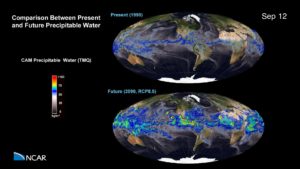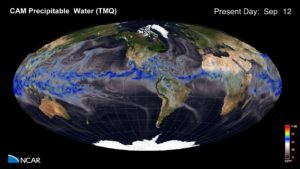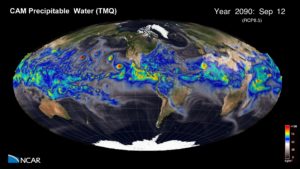This simulation shows a comparison between present day (1990) and future (2090) precipitable water in the Earth’s atmosphere using an RCP8.5 emissions scenario.
Movies
Movie File (.mov, 1920×1080, 236MB)
Images



Science Credits
This simulation was made possible because of the large number of individuals both from within NCAR and the many outside collaborators who have contributed to the CESM development and runs.
Computational Resources
An award of computer time was provided by the Innovative and Novel Computational Impact on Theory and Experiment (INCITE) program. This research used resources of the Argonne Leadership Computing Facility at Argonne National Laboratory, which is supported by the office of Science of the U.S. Department of Energy under contract DE-AC02-06CH11357.
Funding
This research was supported by the Regional and Global Climate Modeling Program (RGCM) of the U.S. Department of Energy’s, Office of Science (BER), Cooperative Agreement DE-FC02-97ER62402.
Visualization and Post-production
Tim Scheitlin and Matt Rehme (NCAR/CISL)
Model
The data for this visualization was generated by the Community Earth System Model (CESM) with a high resolution atmospheric model (0.25 degree) and specified ocean temperatures and sea ice. The CESM is a fully-coupled, global climate model that provides state-of-the-art computer simulations of the Earth’s past, present, and future climate states.
CESM is sponsored by the National Science Foundation (NSF) and the U.S. Department of Energy (DOE).
Visualization Software
The NCAR Command Language (Version 6.1.1) [Software]. (2013). Boulder, Colorado: UCAR/NCAR/CISL/VETS. http://dx.doi.org/10.5065/D6WD3XH5
Acknowledgments
Earth imagery is courtesy of the NASA Visible Earth Project.
